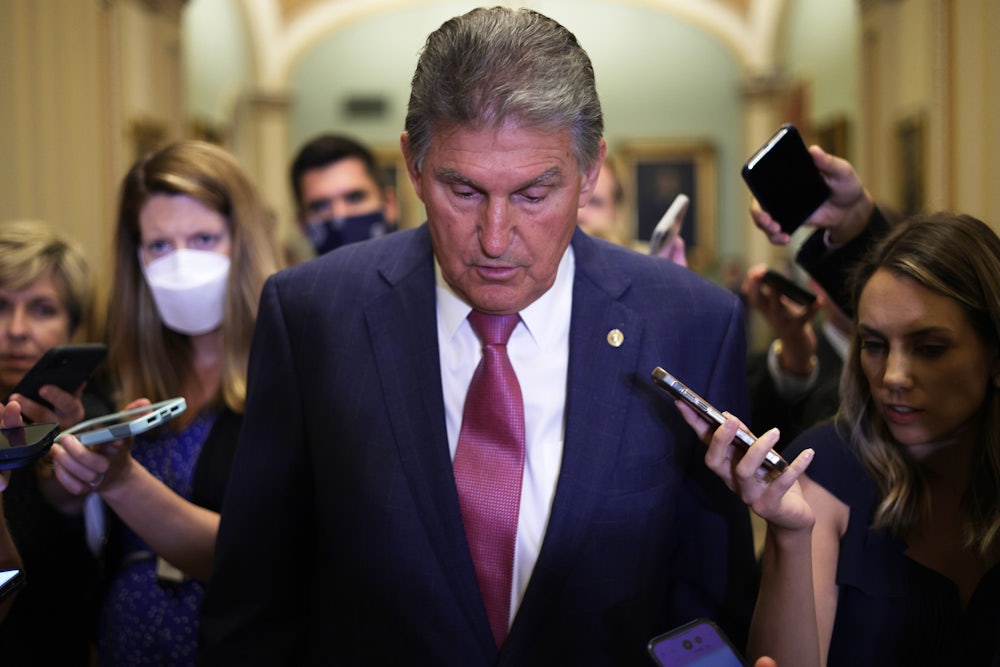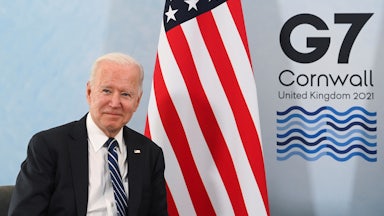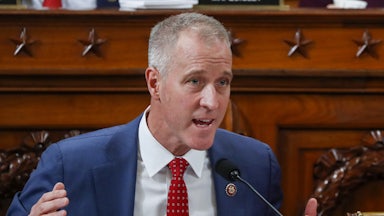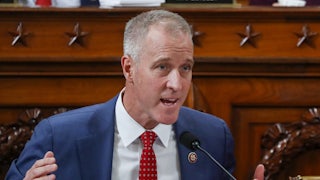The next month will probably determine whether the Democrats will maintain control of Congress after the midterm elections, and maybe even whether Joe Biden gets reelected in 2024. They have to pass two critical bills: a bipartisan infrastructure package and a $3.5 billion budget deal. Every Democrat knows this. And yet these next few weeks are going to be absolutely harrowing as they fight and feud and posture and camouflage their intentions. It’s going to be hell.
The party’s moderate gang has proven to be a bigger problem here than the progressives in the caucus, which is interesting, because a lot of the media assumes that it’s the left that is unruly and insurgent and inflexible and ridiculously idealistic. I don’t know how people will vote, but I haven’t heard a discouraging word out of AOC, and Bernie Sanders is being a loyal soldier despite the fact that the bill is $2.5 trillion less than he wanted. How soon some forget: It’s usually the moderates who make trouble. Remember the eleventh-hour preening over abortion coverage in Obamacare, led by then–Michigan Representative Bart Stupak? They nearly killed the bill.
Today’s moderates—first and foremost Joe Manchin, but many others—are going to follow the same script. Why do moderates do this? I think I know the answer: They’re acting on some well-worn assumptions about elections—midterm elections, in particular—that are now outdated. In sum, moderate Democrats are always looking for opportunities to distance themselves from the national party. That made some political sense as recently as a decade ago. These days, however, I think there is no separating oneself from the national party. It’s futile.
I have more sympathy than most coastal liberals for the plight of the swing-district Democratic House member. I guess that comes from being from West Virginia. I know what those places are like, and I understand the pressures that moderate Democrats can face. As I’ve written many times, it’s exactly those purple districts that Democrats have to win to get to 218 seats. Nancy Pelosi is right to keep them top of mind, because without Democrats representing districts like Iowa’s 3rd and Wisconsin’s 3rd and Arizona’s 1st and Virginia’s 7th, the Democrats are in the minority. And then the debate isn’t between $3.5 trillion and $1.5 trillion. It’s between zero and zero.
Swing-district moderates worry that if they vote for $3.5 trillion, they’re going to spend all of next year getting tagged as socialists in grossly distorted 30-second attack ads. They’re not wrong. But guess what? They’re going to spend all of next year getting tagged as socialists in grossly distorted 30-second attack ads if they vote for $1.5 trillion, too. No one should be surprised if they get attacked as socialists even if they block every dollar from being spent. That’s the nature of politics these days.
It used to be that the parties were amalgams of different groups. The Democrats were Northern liberals, Southern racists, and some moderates from the Midwest and the Great Plains. The Republicans were Goldwater conservatives, Northern moderates and even some liberals, and prairie nativist-populists. Back then, a member of Congress or a senator could maintain an individual identity somewhat distinct from his or her party.
This meant that with specific respect to midterm elections—so political scientists and convention wisdom–mongers told us—voters looked at these lawmakers differently than they did in presidential election years. Those quadrennial contests were when voters thought about the big picture: things like the economy and war. In midterms, they thought about whether Congressman So-and-So had delivered the goods: funding for a local hospital or highway; meaningful face time at the local church or VFW hall.
Those days are long gone. They started disappearing in the age of Newt Gingrich, whose 1994 “Contract With America” ushered in the first era of “nationalization” of midterm elections. Now, post-Trump, I’d argue we’ve entered a second and far more intense era of nationalization. Everything is polarized. The culture war subsumes all. And my hypothesis is that this has changed the way the midterm electorate thinks. Now, every election is not just a national election—every election is a high-stakes, life-and-death battle against a mortal enemy. Voters know now that the consequences of every election are high to the point of existential.
And so midterm elections now are just like presidential elections: The same issues are at stake. Turnout may be lower, but not by much. Turnout in 2018 was almost 50 percent—the highest in a midterm since 1914. We’ll see next year if that was a one-off. I’d wager not.
What this means for moderates, I believe, is two things. First, like it or not, it’s a lot harder now to distance oneself from the national party. The whole country watches the same cable news shows. Voters know more than ever about what the parties stand for. Whatever the national party does, the local member of Congress is going to be tagged with it, for good or ill.
Second, I’d argue that there is far less benefit to distancing from the party than there used to be. There are fewer true swing voters. But there are a lot of potential base voters out there to be registered and urged to the polls. And the best way to get those people to register and vote is, without question, to be able to go to them next year and say: Look, I got you paid family leave! Dental coverage in Medicare! Free community college! Child tax credit! I voted for these things. My opponent would have opposed them.
I understand that moderates want to negotiate the number down a little, just so they can go home and say, “Hey, I negotiated it down a little.” But they have to commit to a yes vote, and then they have to go back to their states and districts and spike the damn football. They need to boast about what they voted for, show some pride, and play offense. This applies even to Manchin. He’s a special case because he’s not just in a swing state; he’s in the Trumpiest state in the country. But the people of West Virginia can make great use of the things in these bills as much as people from anywhere else. Perhaps even more so.
Hopefully, moderates will cotton on to these new political realities and join a unified Democratic team. Otherwise, this is going to be four or however many weeks of torture, inflicted on the party by moderates who are operating according to a model that I believe no longer applies. Keeping the Republicans from winning the House may be a long shot. But we’ve entered a new era of hypernationalization, when distancing from one’s party is impossible and even inadvisable. The things in that bill are very popular, so pass it, and own it. It’s the Democrats’ only shot at keeping their majorities.








